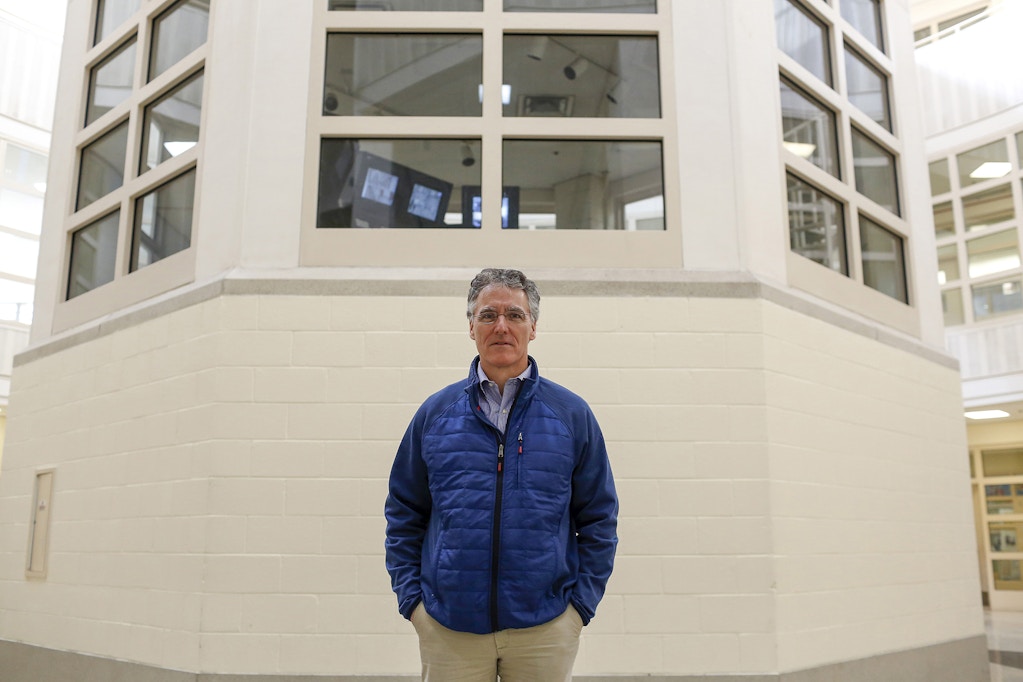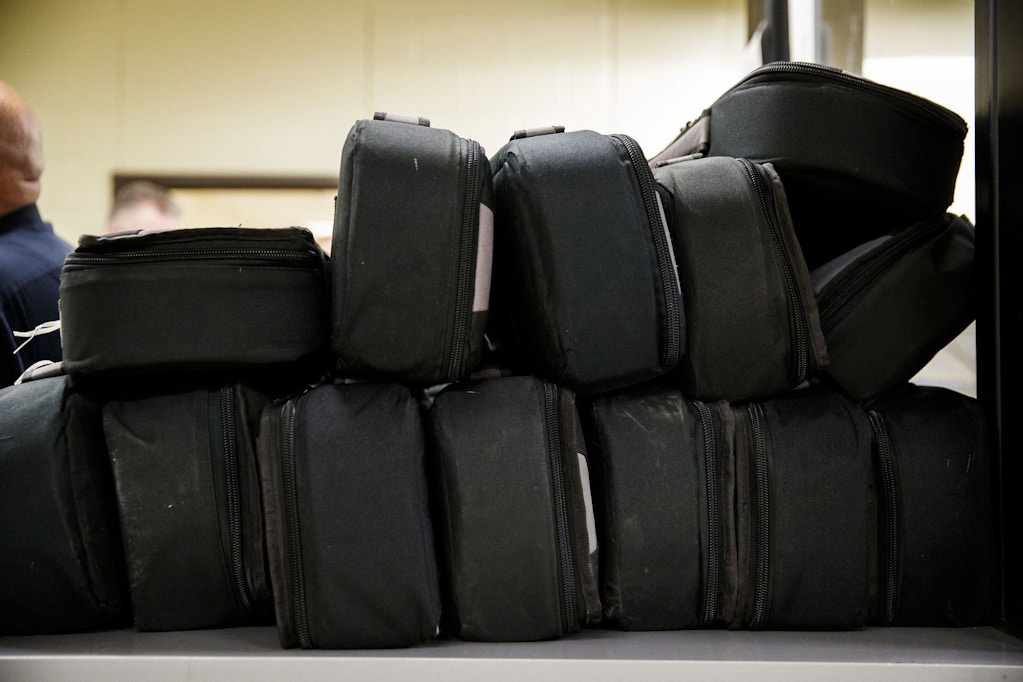
Eddie Raymond needed to run to the store to grab some toilet paper on a January day this year. Under an Illinois law that had gone into effect at the start of the month, he was entitled to leave home at least two days a week to run such an errand — notwithstanding the GPS monitor affixed to his ankle that allowed the local sheriff’s office to track his every move. When Raymond contacted the sheriff’s call center to check in before leaving home, though, he was told that he didn’t have permission to go out that day. The explanation startled him.
“They said if you have work movement, you’re not supposed to get your essential days, because your essential days qualify for work,” recalled Raymond, who asked to be identified by a pseudonym to protect his privacy. “I told them that doesn’t make sense.”
Raymond had unknowingly run into a policy quietly implemented by Cook County Sheriff Tom Dart. He wasn’t getting his “essential days,” guaranteed by law, because he also had regularly scheduled permission to go to work.
In 2021, Illinois passed a criminal justice reform bill called the Pretrial Fairness Act that, among other things, extended modest additional privileges to people under electronic monitoring, commonly known as EM. Dart installed a policy to unilaterally limit those privileges — limits that reform advocates said violate the spirit, if not the letter, of the new law.
The law guarantees twice-weekly movement for essential tasks, such as going to the grocery store or a doctor’s appointment, to “any person” subject to house arrest while awaiting trial for criminal charges. Some people under EM, however, also have court orders allowing for recurring movements, such as going to work or attending school. Dart’s office systematically excludes the latter group with regularly scheduled days — people like Raymond — from taking advantage of the extra essential task days bestowed by the reform law.
“Absent a court order specifying days, each participant shall be given a schedule assigned by the contracted vendor,” reads a policy document from Dart’s office obtained by The Intercept through the Freedom of Information Act, referring to the private firm contracted by the sheriff to administer the EM program.
A spokesperson for Dart confirmed that the policy excludes people with fixed movement schedules. “For individuals with court-ordered movement, free movement is not automatically applied,” Matt Walberg, the communications director at the sheriff’s office, wrote in an email. “However, individuals in these situations can request additional movement.” Walberg disputed that the policy is at odds with the law, stating that because the provision about essential movement “follows the paragraph allowing for specific orders of approved movement, it is clear that free movement is to be granted in cases where the individual does not have court or Sheriff’s authorized movement.”
Dart has been publicly critical of the EM reforms, amid a broader campaign of opposition to the Pretrial Fairness Act, ahead of the January 1, 2023 start date of the law’s most substantial provision: the elimination of money bail.
“Passing the law was really the first baby step toward changing the structure of our courts,” said Sarah Staudt, a senior policy analyst at the Chicago Appleseed Center for Fair Courts. “We know that there are lots of judges across the state who don’t agree with the elimination of cash bail. We know there are lots of court administrators and sheriffs and state’s attorneys who feel the same way.”
The Pretrial Fairness Act, which was passed as part of a larger bill called the SAFE-T Act, has long been opposed by police, prosecutors, and Republicans in the state. As its provisions have gone into effect, local media, policymakers, and elected officials — including Chicago Mayor Lori Lightfoot, a Democrat — have tried to undermine it by pointing to pretrial reforms as a driver of crime, despite evidence to the contrary. While ending money bond is a step toward reducing wealth-based discrimination in pretrial detention, it does not prevent courts from locking up people who are awaiting trial if there is a public safety reason for doing so.
Opposition to ending cash bail intensified in the run-up to last week’s election. A right-wing political action committee funded by Republican mega-donor Dick Uihlein ran a racist disinformation campaign about bail reform that included sending out fake newspapers with sinister headlines and mugshots of Black men.
Democratic lawmakers, meanwhile, have taken the bait. While they have not gone as far as calling to repeal bail reform, some are considering a measure that would keep more people incarcerated before trial. In September, Democratic state Sen. Scott Bennett introduced a bill to “address concerns by local law enforcement” that would water down a reform requiring citations rather than arrests for minor crimes, expanding the universe of people who could be jailed pretrial and imposing a presumption of jail time for certain charges. A few months earlier, during the final hours of the spring legislative session, the state House passed a bill introduced by one of the lead sponsors of the SAFE-T Act that would allow judges to revoke essential movement permissions for people facing forcible felonies — a special category of charges relating to violent crimes.
“The real reason is not fear for public safety. The real reason is racism, money, and power.”
Bennet introduced his bill amid negotiations between lawmakers, stakeholders, and advocates over a trailer bill that would amend the SAFE-T Act, a priority for passage as the Illinois legislature convenes for a six-day veto session that begins this week. The Illinois Network for Pretrial Justice, an advocacy coalition that worked with the Legislative Black Caucus to pass the Pretrial Fairness Act, is advocating for changes that would strengthen the law’s protections. Police groups are pushing to gut it — with advocates worried they want to scrap it entirely.
Though public debate has largely focused on money bail, the EM reforms are on the chopping block as well. Within the last month, both Dart and Chicago Police Superintendent David Brown have called on lawmakers to curtail them.
Efforts like the one in Illinois to undo reforms are happening across the country. The passage of significant reforms — and the election of prosecutors who stopped or reduced their offices’ use of money bail for people accused of low-level offenses — is consistently met with fierce resistance. Earlier this year, New York Gov. Kathy Hochul controversially rolled back the state’s landmark 2019 bail reform law.
Bina Ahmad, a California-based civil rights attorney, said the anti-reform campaign in Illinois appears to follow the same playbook that was used to gut bail reform in New York, where she had worked as a public defender. “It’s one large machine that is running to keep people in jail and make money off of their slave labor in jail, and employ hundreds of thousands of police officers and correction officers and wardens and all the people who make money off of the system,” she said. “The real reason is not fear for public safety. The real reason is racism, money, and power.”
Photo: Joshua Lott/The Washington Post via Getty Images
Researchers, advocates, and journalists noted that electronic monitors do more harm than good, including by making it hard for people to get their lives back on track. A 2020 report by the Illinois Supreme Court Commission on Pretrial Practices found that there is no research to indicate that EM advances public safety or makes it more likely that people will appear in court.
Raymond, who was put on a monitor after being arrested at a 2020 Black Lives Matter protest, said the terms of his house arrest made stable employment a challenge. He had a court order allowing him to go to his part-time retail job on a regular schedule. When he moved to a location farther away from work, though, he said the sheriff’s office declined to fully accommodate his need for more commute time. “Getting home is treacherous,” he said. “If they say get in by 6 and I walk in by 6:02 … that’s jail.” That was a risk he was unwilling to take, so instead Raymond quit.
Cook County’s pretrial EM program was introduced in 1989 as a way to reduce overcrowding in local jails. In time, it grew into one of the largest and most restrictive pretrial EM programs in the nation. It also ensnares Black people at highly disproportionate rates, according to an analysis by Chicago Appleseed. “It’s the only program I have encountered where the sheriff has unilateral authority to re-incarcerate people he believes have broken the rule of the program,” said Staudt. “Most programs use EM as a way to monitor people’s location, not as a way to incarcerate them.”
About 21 percent of people on GPS monitors as of October 28 had been awaiting trial for more than a year, with an average span of 7 1/2 months, according to The Intercept’s analysis of the sheriff’s data.
Before this year, program participants were required to get permission from the court or sheriff to leave home for any reason, a process that required advanced notice and burdensome verification. In December, Deputy Public Defender Amy Thompson said that 1,600 people on EM at the time were not able to leave home at all. (The county court’s Adult Probation Department runs a separate EM program, about which there is little publicly available information.)
Last year’s reforms were meant to relieve such barriers to allowing people to address basic needs.
The sheriff’s EM policy sets a fixed schedule for essential movement for people on house arrest, during which time they do not need specific permission to leave home. Yet Dart’s office “continues to nickel and dime people about this movement in ways that are really punitive,” Staudt said.
Staudt was referring to the policy excluding certain populations from essential movement. While the size of the EM population fluctuates daily, numbers provided by the sheriff’s office give insight into the number of people impacted. On November 7, 335 out of 2,012 people on EM had court-ordered movement schedules and were thus not assigned to an essential movement schedule.
The sheriff’s policy states that, for those excluded from essential movement, “one-time movement may be approved without a court order.” That process, however, can be difficult to navigate.
Earlier this year, Lee Mitchell, a 30-year-old photographer in Chicago who was on electronic monitoring, was asked to attend a training session for a new job. Though he had a court order allowing him to leave home for school and work, the training fell outside his approved movement hours, so he had to get separate permission from the sheriff’s office. He submitted documentation for the training, but the sheriff’s office asked for more information. Mitchell’s new employer did not get back to him in time, so he ended up missing the session.
“It’s a hassle. I feel like I’m doing things more than once, and it’s repetitive. Why should I have to do this when I already got permission from the judge, a signed court order saying, ‘You open up his movement,’” said Mitchell, who was arrested during the 2020 racial justice uprising. “That means it don’t matter what the job is or what the hours are. I don’t feel that the employer should have to provide additional documentation.”
Walberg, the sheriff’s spokesperson, wrote that “verification to support the requested movement is necessary to prevent fraudulent requests.” He added: “The Sheriff’s Office works hard to balance the approval of necessary movement that will enable participants to be successful while on the program with our responsibility to ensure participants are abiding by the orders of the court.”
Mitchell’s case was resolved in October, about 19 months after he was placed on a monitor. “I’m still trying to get things together that I couldn’t get together in the two years I was on house arrest,” he said. “Now it’s like I’m actually playing double to get my life in order.”

Nancy Stone/Chicago Tribune/Tribune News Service via Getty Images
Still, he has been optimistic about the rollout of the electronic monitoring reforms. In addition to the essential movement provision, the new law also requires courts to review EM orders every 60 days and states that a person must be in violation of the terms of their home confinement for a full 48 hours before they can be charged with felony escape. The latter change is meant to ensure that people don’t face serious charges for minor violations or technical issues with their ankle monitors.
“It’s not working to where we want it to work,” Mitchell said, “but these changes have produced real results for accused people in this county.”
In a March interview, Mitchell added that he didn’t believe other officials were being intentionally obstructionist. “On balance, the leadership here in Cook County — whether it’s the sheriff’s office, the state attorney’s office, the public defender’s office — in general have been very receptive to these changes,” he said. “But certainly everybody doesn’t agree on everything. I think you see sometimes battles in interpretation, battles of implementation.”
“It’s not working to where we want it to work, but these changes have produced real results for accused people in this county.”
Only a few weeks after Mitchell’s interview, however, Dart made clear that his office disagreed with more than how to implement the law. On April 1, the Chicago Sun-Times reported that Dart had called for a repeal of essential movement, “at least for those charged with violent crimes.” (The premise of the article is that crime is rampant among EM participants allowed to “roam freely,” despite reporting that only 1 percent of participants had been arrested while on essential movement time.)
That sort of change had previously been proposed by Democratic state Rep. Margaret Croke, who consulted Dart’s office before introducing the legislation, according to emails obtained by The Intercept under FOIA. Last December, a few weeks before the EM reforms kicked in, Croke, who represents majority white neighborhoods on Chicago’s north side, met with Jason Hernandez, the sheriff’s executive director of intergovernmental relations. Afterward, Croke’s chief of staff sent an email that clarified the representative’s interest in the program: “I’m curious if any data exists somewhere for how many EM program participants end up either: 1) violating the terms of their participation 2) end up engaging in another illegal activity.”
Nearly 30 minutes later, Croke followed up. “Can you please share with me what violent crimes the Sheriff’s Office would like to see restricted from being eligible for the EM program? I want to start having conversations with my fellow legislators on the topic,” wrote Croke, copying fellow Chicago-area state Rep. Ann Williams. “I think we can all agree that individuals charged with murder should not be allowed to participate on the program. Furthermore, I imagine more people will be on the EM program after the end of cash bail.”
Hernandez did not answer Croke’s questions by email, but he invited the lawmakers to tour the EM program and meet with leadership. (The visit never materialized due to scheduling conflicts.)
On January 4, Croke again wrote to Hernandez, this time sharing two draft bills. The first sought to prevent people accused of certain violent crimes or sex crimes from having “free unrestricted liberty from 7am to 7pm.” The second was a draft of a bill to expand the list of criminal charges that would make an individual ineligible for pretrial release to home confinement. Croke never introduced the first bill, while the second was introduced on January 12 and then languished in committee.
“It’s important to me when drafting legislation to engage the key stakeholders and entities that will be impacted to ensure we are creating meaningful legislation,” Croke said in an emailed statement to The Intercept. She attributed her interest in electronic monitoring to an increase in constituent outreach about the issue and pointed to a Chicago Tribune article that reports a claim from Lightfoot’s office that more than 130 people were arrested for violent crimes while out on EM in 2021. A follow-up analysis by the Tribune, however, found serious flaws with the mayor’s data methodology.
Mitchell, for his part, maintained his optimism after the November election. “The voters of Illinois spoke this week, rejecting candidates who ran on fearmongering, misleading attacks on the Pretrial Fairness Act and the wider SAFE-T Act. Historic reforms to our state’s criminal legal system are clearly supported by Illinoisans and are on track for implementation in January,” he said in an emailed statement. “That said, good faith negotiations are ongoing to clarify some details of the reforms during the Illinois legislature’s upcoming veto session.”

Photo: Armando L. Sanchez/Tribune News Service via Getty Images
State Rep. Martin Moylan, a Democrat who represents a suburban district northwest of Chicago, introduced a bill that would make it a felony to tamper with an EM device or signal. The bill, which Croke co-sponsored, was repeatedly scheduled for a hearing but ultimately did not advance.
The bill lawmakers eventually coalesced around — the one allowing judges to take essential movement away from people charged with forcible felonies — could be seen as the legislature’s response to rising crime rates in Chicago. But it’s not based on any statistical evidence, said Alexa Van Brunt, the director of the MacArthur Justice Center Clinic at Northwestern Pritzker School of Law.
Van Brunt pointed to recent analyses by researchers at the University of Chicago Crime Lab that found it very unlikely that people on EM are responsible for Chicago’s recent increase in gun violence. “To introduce a provision to really make it much more difficult for people to reenter society and take care of their families without any basis in social science is just punitive,” she said, “and really actually achieves the opposite of the goal intended.”
Dart reiterated his opposition to the EM reform in an October budget hearing, claiming that his office is forced to turn off GPS monitoring during a person’s period of essential movement, otherwise the alerts they get for people leaving home with permission would drown out the alerts for people leaving home illegally. The law does not require him to stop tracking people’s locations, and as WBEZ reported, “even if the alerts are turned off, the EM bracelet still tracks a person’s location.”
Meanwhile, a group of nationwide advocates and academics have turned their attention to the Administrative Office of the Illinois Courts, which houses a bureau created in the aftermath of the Pretrial Fairness Act dedicated to “increasing equality” in pretrial processes. In a letter sent last week, the advocates expressed concerns that “certain decision-makers” will push back against the law’s progress by either expanding the use of EM or failing to fully implement the provisions of the law. “We encourage you to promote the use of non-punitive programs as part of pretrial release and refrain from expanding the use of pretrial electronic monitoring,” they wrote. “If EM is used, we implore you to ensure that the conditions of EM maximize movement and participation in family and community life, rather than converting homes into jail cells.”
Correction: November 13, 2022, 1:11 p.m. ET
This article has been updated to remove an errant reference to regulations around electronic monitoring for people charged with murder.
Update: November 18, 2022
The subheadline of this story has been updated.











